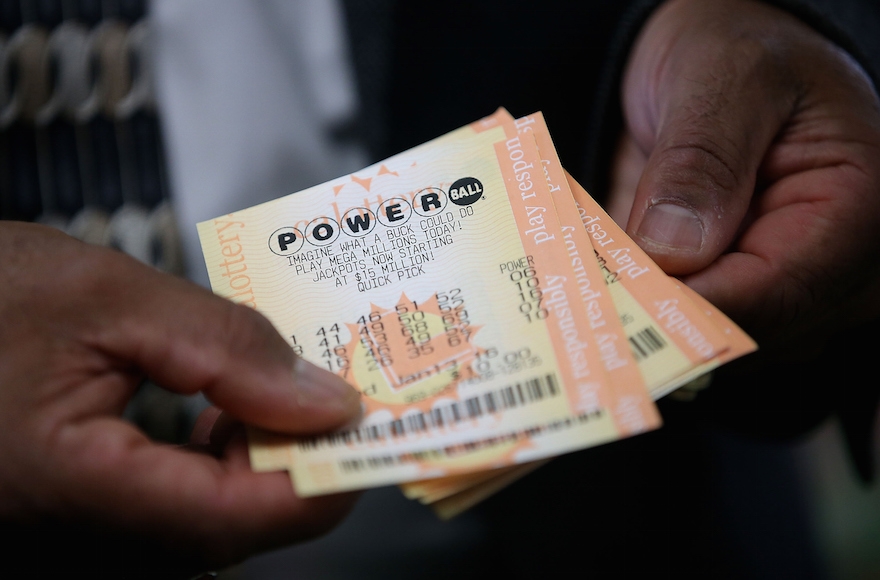Powerball lessons: Why Israeli lottery winners wear masks on TV
Published January 15, 2016

A customer holding Powerball tickets in San Lorenzo, California, Jan. 12, 2016. (Justin Sullivan/Getty Images)
The story of a life ruined by a lottery win is almost a cliche at this point. Remember the character Hurley from the TV show “Lost,” who experiences continual bad luck after hitting the jackpot, or the real-life Florida janitor who was killed for his $17 million lottery winnings?
On Thursday, it was announced that three people had won the highly anticipated Powerball drawing — worth a record $1.6 billion total. The winners reportedly bought their tickets at stores in Chino Hills, California, Melbourne Beach, Florida, and Munford, Tennessee. None of them has yet come forward to claim their enormous prizes.
When they do, we will likely know who they are. All but a handful of states — California, Florida or Tennessee among the majority — require lottery winners to be publicly identified if they want to collect their cash.
In Israel, on the other hand, the lottery keeps the identities of all its winners under wraps — though it has the right to reveal them.
“[A]lthough we have this right, we have never exercised it because we understood the difficulties the winners could encounter in the period after their win. We provide details about the winner, but in a manner that doesn’t disclose their identity,” Dolin Melnik, then-spokesperson for Israel’s Mifal Hapayis lottery told Haaretz in 2009.
As Melnik noted, “Israel is a very small country” — implying this could be a problem for lottery winners.
Mifal Hapayis — the now state-run organization that oversees all legal gambling in Israel — even provides masks to lottery winners so they can’t be identified if they choose to go in front of news cameras. On one of its lottery websites, the organization further recommends hiding jewelry and other identifying markers on TV.
Among the organization’s other suggestions: Go on vacation to a remote place and don’t answer your phone.
Still, there are good reasons lottery winners are made public in the U.S.
Gary Grief, chairman of the Powerball committee (which is part of the Multi-State Lottery Association, a non-profit organization that coordinates the lotteries with states) told The Associated Press that disclosing the names of winners reinforces to the public that “real people do win and that those real people don’t work for the lottery or aren’t involved with lottery.”
Beyond appearances, announcing lottery winners may actually help keep the games honest. Last year, a man named Eddie Tipton who worked for the Multi-State Lottery Association, which runs Powerball among other games, was convicted of rigging a lottery in Iowa to the tune of millions of dollars. Iowa Lottery CEO Terry Rich told The AP that he was exposed because of the state’s policy of identifying winners.
In accordance with U.S. state laws then, the public will know when the three latest Powerball winners become super-rich. Given the national fascination with this record-breaking lottery, traditional and social media will ensure that information gets disseminated almost instantly — including to jealous neighbors, hard-up family members and the criminally inclined.
In some ways, the U.S. is a very small country too.
This entry passed through the Full-Text RSS service – if this is your content and you’re reading it on someone else’s site, please read the FAQ at fivefilters.org/content-only/faq.php#publishers.















